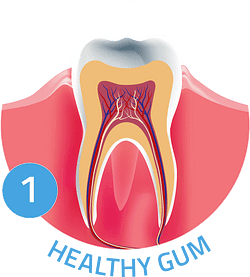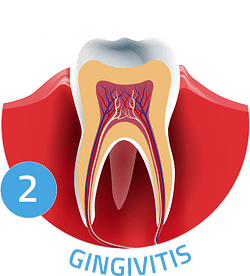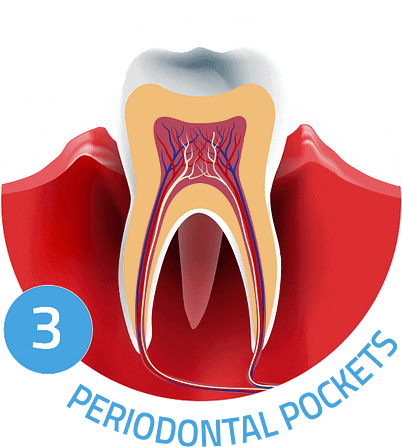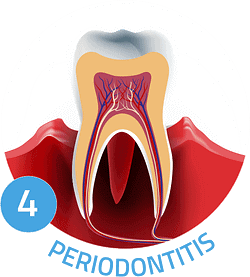Gum Disease Treatment
Gum Disease is Common but Fairly Preventable
Gum disease is a threat to your oral health, and research shows periodontal diseases is a risk factor for heart and lung diseases. If you need treatment, don’t wait!


Don't Delay Treatment!
Do you have Bad Breath, Red, Swollen, or Bleeding Gums?
Periodontal or Gum disease is affected by plaque and tartar (bacteria) buildup. Over time, dental plaque will creep beneath the gum line, forming “pockets” in the middle of the teeth and gums. It worsens as these pockets grow and destroy the bone, considerably impairing your teeth.
Periodontal disease is common but reasonably preventable. Approximately 80% of American adults are currently affected by this disease. It threatens oral health, and studies have shown that periodontal diseases are a risk factor for heart and lung diseases. Signs of periodontal disease are usually only detected once people are in their 30s and 40s. Although adolescents rarely develop periodontitis, the milder form of gum disease, gingivitis, can occur.
Signs of Gum disease
- Persistent Bad breath
- Tender or bleeding gums
- Red or swollen gums
- Receding gums
- Loose or Sensitive teeth
- Bleeding during and after tooth brushing
- Toothache
- Changes in the way teeth fit together upon biting down, or in the fit of partial dentures
Causes of Gum disease
- Poor oral hygiene
- Smoking and tobacco use
- Family History
- Hormonal changes
- Diseases such as diabetes
- Genetics
Stages of Gum Disease

Gingivitis
Is the inflammation of the gums caused by plaque and tartar (bacteria) on your teeth? The gums become red and swollen and can bleed easily. It is a mild form of gum disease usually reversed with daily brushing, flossing, and regular cleaning by a dentist or dental hygienist. This gum disease does not include any loss of bone and tissue that hold teeth in place.
Periodontitis
It is the inflammation around the tooth which occurs when gingivitis is not treated. The bacteria creeps beneath the gum line, and the gums pull away from the teeth and form “pockets” that are infected. Your body’s immune system fights the bacteria as it spreads and grows below the gum line. Bacterial toxins and the body’s enzymes fighting the infection start to break down the bone and connective tissue that hold teeth in place. The bones, gums, and connective tissue that support the teeth will be destroyed if not treated. The teeth may eventually become loose and have to be removed.
Gum Disease Treatment
The number and types of treatments will vary depending on the severity of gum disease. But the primary goal of treatment is to control the infection, and the earlier you treat gum disease, the better chance you have of recovery because once gum tissue is lost, it doesn’t grow back! The following are a few methods our dentist may use to treat gum disease:
SCALING AND ROOT PLANNING (DEEP CLEANING)
Scaling is a non-surgical approach where dental plaque and tartar deposits on the tooth and beneath the gums will remove using a scaler. Although it’s a common practice to scrape away deposits, at our Buford Dental Office manually, we use state-of-the-art ultrasonic dental cleaners, which use ultrasound vibrations to break up dental calculus. Root planning removes rough spots on the tooth root where the germs gather and help remove bacteria that contribute to the disease. This gum disease treatment helps gum tissues to heal and gum pockets to shrink with the help of prescribed medications. A deep cleaning helps prevent gum disease from spreading, and it may be able to reverse the signs of gingivitis, which is the earliest stage of gum disease.
PERIODONTAL SURGERY
Surgery will be needed if deep cleaning procedures and medications do not cure gum disease. We will send you to a periodontist, who may do flap surgery to remove tartar deposits from deep pockets or to reduce the periodontal pocket and make it easier for the patient, dentist, and hygienist to keep the area clean. A bone and tissue grafting procedure may be needed if the disease has destroyed part of the bone and the existing gums are too diseased to sew back together.
Preventative care is necessary to keep gums healthy after the treatment is complete. Brushing and flossing daily will help fight the dental plaque that is constantly forming around teeth. Regular dental visits are also required to remove the dental calculus you’ve missed.
If you need treatment, don’t wait!
Periodontal diseases can cause other health problems
that go well beyond your mouth
- Alzheimer’s, Cognitive memory
- An increased risk of heart attack or stroke
- Lung / Respiratory disease
- Diabetes
- Gastric Ulcers
- Osteoporosis
- Preterm, low birth weight babies
FAQs
Is scaling and root planning procedure painful?
Dental anesthesia is usually administered during the procedure to control sensitivity and pain. If necessary, a medication may be given to help you relax during the procedure, and we may prescribe something for post treatment discomfort as well. Most patients can return to their regular activities following the scaling procedure.
How can I prevent gum disease?
Professional cleanings at least twice a year, proper oral hygiene (daily brushing and flossing), antibacterial mouth wash. Stop smoking and tobacco use. According to the American Academy of Periodontology, up to 30% of Americans may be genetically susceptible to gum disease. So you could be affected despite following good oral hygiene practices and other healthy lifestyle choices.
Radiant Dental Is Surrounded With
So Much Love from All Over Georgia
Contact US
Address
Business Hours
| Mon, Wed | 8:30 AM – 5:00 PM |
| Tue, Thurs | 11:00 AM – 7:00 PM |
| Saturday | 8:00 AM – 2:00 PM |




